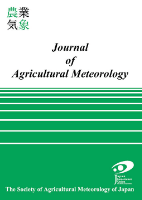
JOURNAL OF AGRICULTURAL METEOROLOGY
Scope & Guideline
Advancing Research at the Intersection of Climate and Crops.
Introduction
Aims and Scopes
- Impact of Climate on Agriculture:
Research focusing on how various climatic factors, such as temperature and precipitation, affect agricultural productivity and crop yields. - Mitigation of Agricultural Emissions:
Studies aimed at understanding and reducing greenhouse gas emissions from agricultural practices, including methane and carbon dioxide. - Crop Physiology and Adaptation:
Investigations into how crops respond physiologically to environmental changes, including light, temperature, and atmospheric CO2 levels. - Remote Sensing and Monitoring Techniques:
Utilization of advanced technologies such as drones and satellite imagery for monitoring crop health, growth, and environmental impacts. - Soil and Water Management:
Research on soil health, moisture management, and the effects of various agricultural practices on soil and water resources. - Ecosystem Services and Biodiversity:
Exploration of how agricultural practices influence ecosystem services and biodiversity within agricultural landscapes.
Trending and Emerging
- Climate Change Adaptation Strategies:
Increasing focus on developing and assessing strategies for agricultural adaptation to climate change, including crop diversification and resilient farming practices. - Utilization of Machine Learning Techniques:
Growing interest in applying machine learning and artificial intelligence to analyze agricultural data and improve predictive modeling for crop yields and environmental impacts. - Sustainable Agricultural Practices:
A rising trend towards research on sustainable practices, including organic farming and agroecology, emphasizing environmental stewardship and resource conservation. - Integration of Remote Sensing Data:
Enhanced incorporation of remote sensing technologies for monitoring and evaluating agricultural systems, leading to more precise and timely agricultural management. - Research on Crop Resilience to Extreme Weather:
Increased studies focusing on how crops can withstand extreme weather events, such as droughts and floods, highlighting the need for resilient agricultural systems.
Declining or Waning
- Historical Climate Assessments:
There has been a noticeable decrease in publications focusing solely on historical climate assessments in agriculture, as more emphasis is placed on real-time data and predictive modeling. - Traditional Pest Management Practices:
Research on conventional pest management strategies appears to be waning, possibly due to a shift toward integrated pest management and sustainable farming practices. - Static Modeling Approaches:
The use of static models to predict agricultural outcomes is declining as dynamic, real-time modeling approaches gain traction, reflecting the need for more adaptable agricultural strategies.
Similar Journals
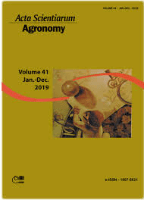
ACTA SCIENTIARUM-AGRONOMY
Connecting researchers to the pulse of agricultural innovation.ACTA SCIENTIARUM-AGRONOMY is a prestigious, peer-reviewed journal published by UNIV ESTADUAL MARINGA, PRO-REITORIA PESQUISA POS-GRADUACAO, focusing on advanced research in the field of agronomy and crop science. Since its inception as an Open Access journal in 2007, it has significantly contributed to disseminating high-quality research, allowing unrestricted access to its content for a global audience. Operating from Brazil, the journal holds a notable Q2 category ranking in Agronomy and Crop Science as of 2023, validating its importance within the academic community. The journal’s Scopus ranking positions it in the 49th percentile among Agricultural and Biological Sciences, indicating a robust foundation for impactful research. With a commitment to innovation and scientific excellence, ACTA SCIENTIARUM-AGRONOMY aims to provide researchers, professionals, and students with vital insights that drive forward our understanding of agriculture and its environmental implications.
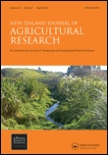
NEW ZEALAND JOURNAL OF AGRICULTURAL RESEARCH
Advancing Agricultural Science for a Sustainable FutureNEW ZEALAND JOURNAL OF AGRICULTURAL RESEARCH is a prestigious, peer-reviewed journal published by Taylor & Francis Ltd that has been at the forefront of agricultural science since its inception in 1958. With a strong focus on the fields of Agronomy and Crop Science, Animal Science and Zoology, Plant Science, and Soil Science, this journal has established itself in the academic community, achieving a notable Q2 ranking in various agricultural categories as of 2023. The journal thrives on its commitment to disseminating cutting-edge research and innovative practices that address contemporary challenges in agriculture. Although it does not currently offer an open access option, its valuable contributions can be accessed through various academic platforms, ensuring that vital research reaches a wide audience of researchers, professionals, and students globally. The journal's continued relevance and authority are reflected in its strong Scopus rankings, further emphasizing its role as a critical journal within the agricultural sciences.

Agricultural & Environmental Letters
Innovating practices for a sustainable tomorrow.Agricultural & Environmental Letters, published by WILEY, is an esteemed open-access journal dedicated to advancing knowledge in the fields of agronomy, environmental science, and soil science. Since its inception in 2016, the journal has provided a vital platform for researchers, professionals, and students to contribute to critical discussions on sustainable agricultural practices and environmental management. With an impressive 2023 impact factor placed in the Q2 category across various fields—namely Agronomy and Crop Science, Management, Monitoring, Policy and Law, and Soil Science—this journal occupies a significant position in academic discourse. The journal’s Scopus rankings further attest to its influential role; it ranks in the top half of its categories, reflecting the quality and relevance of the research published within. Agricultural & Environmental Letters welcomes innovative research articles, reviews, and empirical studies focusing on pressing environmental and agricultural issues, ensuring accessibility for a global audience committed to sustainability in agriculture and environmental stewardship.

AGROCIENCIA
Elevating research to meet the challenges of agriculture.AGROCIENCIA, published by COLEGIO POSTGRADUADOS, is a key journal in the fields of agronomy, animal science, and environmental science in Mexico. With an ISSN of 1405-3195 and an E-ISSN of 2521-9766, this journal has been a crucial platform for disseminating research findings since its inception in 2000. Operating from Montecillo, Estado Mexico, it provides an outlet for scholars and practitioners to share innovations and insights that directly impact agricultural practices and environmental sustainability. Despite its current categorization in the Q4 quartile across multiple disciplines, AGROCIENCIA strives to elevate the quality and reach of research, fostering a collaborative approach to tackle pressing issues within the agricultural sciences. Access options are primarily through institutional subscriptions, allowing for a diverse audience of researchers, professionals, and students to engage with the latest studies aimed at advancing knowledge in the agricultural sector. As the journal converges towards its 2024 milestone, it remains dedicated to enhancing scientific inquiry and promoting effective solutions within its discipline.

Agrociencia Uruguay
Pioneering Agricultural Solutions from UruguayAgrociencia Uruguay, published by the Universidad de la República, Facultad de Agronomía, serves as a vital academic platform in the field of agricultural and biological sciences. Since its inception in 1997, this Open Access journal has fostered the dissemination of innovative research findings, promoting collaboration among researchers, professionals, and students interested in agronomy, crop science, soil science, and plant science. Operating from Montevideo, Uruguay, the journal strives to address contemporary challenges in agriculture through the publication of high-quality, peer-reviewed articles. Despite its relatively modest impact factors and rankings in Scopus, positioned in the lower percentiles, Agrociencia Uruguay remains crucial for advancing local and regional agricultural knowledge, thus contributing to global food security and sustainable practices. Researchers are encouraged to engage with the journal's content to further enhance their understanding and explore the rich agricultural landscape of Uruguay and beyond.
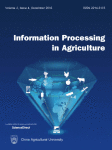
Information Processing in Agriculture
Unlocking Agricultural Potential through Interdisciplinary InsightsInformation Processing in Agriculture, published by Elsevier, stands at the forefront of interdisciplinary research merging agriculture with cutting-edge computational techniques. With an impressive impact factor derived from its classification within the Q1 quartile across five critical categories—including Agronomy, Animal Science, Aquatic Science, Computer Science Applications, and Forestry—this journal exemplifies excellence in scholarly communication. Open Access since 2014, Information Processing in Agriculture not only democratizes access to pioneering research but also accelerates innovation by breaking barriers for researchers, professionals, and students alike. The journal's comprehensive scope facilitates crucial dialogue on the implications of processing technologies in farming practices, contributing significantly to advancements in sustainability and efficiency within the global agricultural sector. As it converges topics from 2014 to 2024, scholars are invited to explore and contribute to a robust platform dedicated to enhancing food security and environmental stewardship.
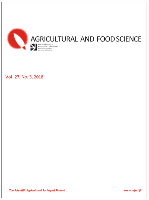
AGRICULTURAL AND FOOD SCIENCE
Exploring the intersection of agriculture and technology.AGRICULTURAL AND FOOD SCIENCE is a prestigious journal published by the SCIENTIFIC AGRICULTURAL SOCIETY OF FINLAND, dedicated to advancing knowledge in the fields of agricultural and food sciences. With an ISSN of 1459-6067 and E-ISSN of 1795-1895, this open-access journal has been providing valuable insights and research findings since its inception in 2002. As of 2023, it holds a Q3 ranking in Food Science and is positioned at the 46th percentile within its Scopus category, ranking 210 out of 389 journals in Agricultural and Biological Sciences – Food Science. The journal features contributions from a global network of researchers, covering various topics including sustainable agricultural practices, food safety, and innovative food technologies. Based in Finland, the journal serves as an essential platform for scholars, professionals, and students who are committed to enhancing food security and agricultural productivity through rigorous scientific research. The convergence of interdisciplinary studies from 2004 to 2024 marks a critical evolution in the scope of agricultural and food research, making this journal a vital resource for anyone involved in these dynamic fields.
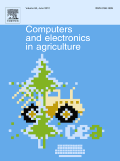
COMPUTERS AND ELECTRONICS IN AGRICULTURE
Bridging Tradition and Innovation in AgricultureCOMPUTERS AND ELECTRONICS IN AGRICULTURE, published by Elsevier Science Ltd, is a premier interdisciplinary journal dedicated to the exploration and application of computing and electronic technologies within agricultural sciences. With an impressive impact factor reflected in its Q1 status across multiple categories, including Agronomy and Crop Science, Animal Science and Zoology, and Computer Science Applications, this journal stands out as a leading platform for advancing research in these critical fields. The journal's aims include fostering innovation and facilitating knowledge transfer between academia and industry by disseminating high-quality research that addresses the challenges of modern agriculture through technological solutions. For researchers, professionals, and students dedicated to enhancing agricultural productivity and sustainability, COMPUTERS AND ELECTRONICS IN AGRICULTURE serves as an essential resource, offering insights that push the boundaries of traditional practices while embracing the digital future of agriculture.

Agronomy-Basel
Fostering Collaboration in Crop Management and SustainabilityAgronomy-Basel is a leading international journal dedicated to advancing the field of agronomy and crop science, published by the respected MDPI. Since its inception in 2011, this open-access journal has provided a vital platform for the dissemination of high-quality research, featuring innovative studies and reviews that contribute to the understanding of agricultural practices and crop management. With an impressive impact factor and ranked in the Q1 quartile of its category for 2023, Agronomy-Basel has established itself as a premier resource in the realm of Agricultural and Biological Sciences, achieving a commendable rank of #62 out of 406 in its field, placing it in the 84th percentile. The journal targets researchers, professionals, and students who are dedicated to enhancing agricultural sustainability and productivity. Located in Basel, Switzerland, the journal's commitment to open access empowers global accessibility to flourishing agricultural advancements, thus fostering collaboration and innovation across the globe.

Icelandic Agricultural Sciences
Nurturing Sustainable Practices in AgronomyIcelandic Agricultural Sciences, published by RANNSOKNASTOFNUN LANDBUNADARINS, serves as a vital platform for the dissemination of research in the field of Agronomy and Crop Science. Established to contribute to the advancement of agricultural knowledge in Iceland and beyond, this journal aims to foster collaboration among researchers, professionals, and students dedicated to sustainable agricultural practices. Despite facing a Q4 category ranking in 2023 and a ranking of #344/406 in Scopus, the journal continues to attract diverse research contributions, especially focusing on unique challenges and innovations pertinent to Icelandic agriculture. The journal operates under a traditional access model, providing an essential resource for those looking to deepen their understanding of agronomic developments and their implications for the agricultural sector. With a commitment to increasing awareness and promoting scientific dialogues, Icelandic Agricultural Sciences plays a crucial role in nurturing the field's growth and enhancing agricultural research.